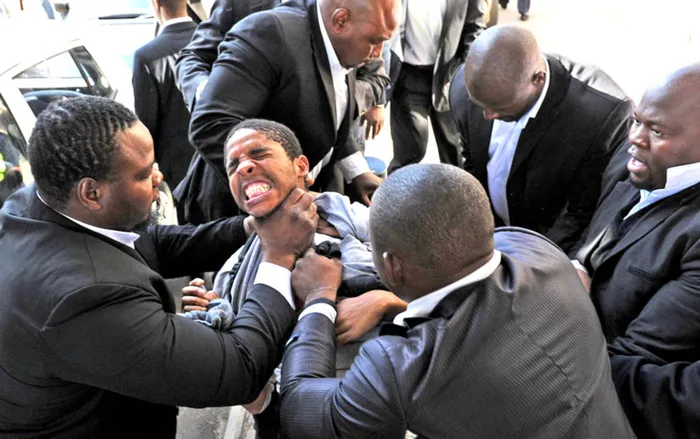Minister probes funding means test

Students prevented vehicles from entering Wits University at the Yale Road Entrance. Members of a private security company forcefully removed the students from the security check point. A fraca ensued between the security staff and the students who started throwing rocks. 281015. Picture: Chris Collingridge 129 Students prevented vehicles from entering Wits University at the Yale Road Entrance. Members of a private security company forcefully removed the students from the security check point. A fraca ensued between the security staff and the students who started throwing rocks. 281015. Picture: Chris Collingridge 129
Minister of Higher Education and Training Blade Nzimande is studying the National Student Financial Aid Scheme (NSFAS) report he requested with a view on possibly broadening support to students, who fall through the net.
The minister confirmed to Independent Media yesterday the report was finally on his desk, but said it was too early to comment.
The NSFAS means test cuts off students from working and lower and aspirant middle classes, who earn more than the threshold of an annual R120 000 household income, but who are not rich enough to carry the burden of university education costed by some at R100 000 a year including accommodation and books.
NSFAS is undergoing a forensic audit following years of claims of mismanagement.
During this financial year, NSFAS received R4 billion and its allocation will increase to R4.3bn in the 2016/17 financial year, according to Nzimande.
About half of South Africa’s one million students rely on some level of NSFAS funding.
Nzimande’s confirmation that the long-awaited report was now with him came on the eve of today’s announcement about how the zero percent fee increase for next year would be funded.
It is estimated an additional R2.6bn would be needed from a tight fiscus in a low-growth economy.
Yesterday, Nzimande did not give anything away on the possible funding sources when he briefed MPs on higher education funding, university transformation and other related matters.
However, he said he would appeal to “the highest court” a recent court ruling against him in relation to the reduction to 20 percent, from 50 percent, the mandatory skills grants to employers – and getting Sectoral Education and Training Authorities (Setas) to pay over unspent funds.
This case before the Labour Court dates back to 2013 when Business Unity South Africa (Busa) took the minister to court in what Nzimande described as a “political case”.
“That case is an attack on our efforts to redirect money (towards higher and vocational training). It’s an unpatriotic stance… and insensitive.
“I will take Busa to the highest court. I feel this is a real injustice…
‘It’s political.”
While Nzimande’s frustration showed when he recounted how one Seta spent R43 000 per head on a two-week training course on emotional intelligence, his decision to appeal the case was welcomed by the ANC in the committee.
“You are on the right track to appeal that case.
“I urge you to take it to the highest court. We can’t be bullied by Busa,” said ANC MP Madipoane Mothapo.
Nzimande has put the spotlight on business’ silence during the student protests, even though they benefit from government investment in graduates.
Universities have been sharply criticised for claiming autonomy to resist accountability, although it has now emerged a draft law to re-balance that, and address transformation, would soon be tabled in Parliament.
Meanwhile, the deputy director-general in the department, Dianne Parker, yesterday dismissed claims made during the protests that universities sat on enormous cash reserves.
“There is no university in the system that has outrageous reserves,” she said.
CAPE ARGUS